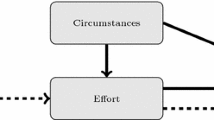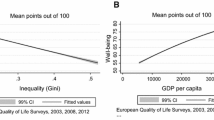Abstract
This article shows for the first time that people are less satisfied when inequality in their country is higher than before, but not when inequality in their country is higher than in another country. It distinguishes this between- and within-country effect of inequality on life satisfaction by using hybrid regressions with the World Values Survey, the British Household Panel Study, the Australian panel study of Household Income and Labour Dynamics, the Korean Labor and Income Panel, the Russian Longitudinal Monitoring study, the Swiss Household Panel and the German Socio-Economic Panel. That life satisfaction is unaffected by long-run levels of inequality, but by changes of inequality over time, suggests that life satisfaction researchers should focus on changes of inequality over time to understand its influence on life satisfaction.


Similar content being viewed by others
References
Alesina, A., Di Tella, R., & MacCulloch, R. (2004). Inequality and happiness: Are Europeans and Americans different? Journal of Public Economics, 88(9–10), 2009–2042.
Allison, P. D. (2009). Fixed effects regression models (quantitative applications in the social sciences). Thousand Oaks, CA: Sage.
Bell, A., & Jones, K. (2015). Explaining fixed effects: Random effects modeling of time-series cross-sectional and panel data. Political Science Research and Methods, 3(01), 133–153. doi:10.1017/psrm.2014.7.
Berg, M., & Veenhoven, R. (2010). Income inequality and happiness in 119 nations. In B. Greve (Ed.), Happiness and social policy in Europe (pp. 174–194). Cheltenham: Edward Elgar.
Bjørnskov, C., Dreher, A., Fischer, J. A. V., Schnellenbach, J., & Gehring, K. (2013). Inequality and happiness: When perceived social mobility and economic reality do not match. Journal of Economic Behavior and Organization, 91, 75–92.
Brickman, P., & Campbell, D. T. (1971). Hedonic relativism and planning the good society. In M. H. Appley (Hrsg.)(Ed.), Adaptation-level theory (pp. 287–302). New York: Academic Press.
Brickman, P., Coates, D., & Janoff-Bulman, R. (1978). Lottery winners and accident victims: Is happiness relative? Journal of Personality and Social Psychology, 36(8), 917–927.
Brockmann, H., Delhey, J., Welzel, C., & Yuan, H. (2009). The China puzzle: Falling happiness in a rising economy. Journal of Happiness Studies, 10(4), 387–405. doi:10.1007/s10902-008-9095-4.
Bryan, M. L., & Jenkins, S. P. (2013). Regression Analysis of country effects using multilevel data: A cautionary tale. In ISER Working Paper Series: 2013–2014.
Caner, A. (2014). Happiness, comparison effects, and expectations in Turkey. Journal of Happiness Studies, 16(5), 1323–1345. doi:10.1007/s10902-014-9562-z.
Clark, A. E., & D’Ambrosio, C. (2015). Chapter 13—attitudes to income inequality: Experimental and survey evidence. In B. A. Anthony & B. François (Eds.), Handbook of income distribution (Vol. 2, pp. 1147–1208). Amsterdam: Elsevier.
Clark, A. E., Diener, E., Georgellis, Y., & Lucas, R. E. (2008). Lags and leads in life satisfaction: A test of the baseline hypothesis. The Economic Journal, 118(529), F222–F243.
Cojocaru, A. (2014). Fairness and inequality tolerance: Evidence from the life in transition survey. Journal of Comparative Economics, 42(3), 590–608.
Cooper, D., McCausland, W. D., & Theodossiou, I. (2013). Income inequality and wellbeing: The plight of the poor and the curse of permanent inequality. Journal of Economic Issues, 47(4), 939–958.
Curran, P. J., & Bauer, D. J. (2011). The disaggregation of within-person and between-person effects in longitudinal models of change. Annual Review of Psychology, 62(1), 583–619. doi:10.1146/annurev.psych.093008.100356.
Delhey, J., & Dragolov, G. (2014). Why inequality makes Europeans less happy: The role of distrust, status anxiety, and perceived conflict. European Sociological Review, 30(2), 151–165.
Durkheim, É. (1897). Le Suicide: Étude de sociologie. Paris: Félix Alcan.
Easterlin, R. A. (2013). Happiness, growth, and public policy. Economic Inquiry, 51(1), 1–15. doi:10.1111/j.1465-7295.2012.00505.x.
Eksi, O., & Kaya, N. (2016). Life satisfaction and keeping up with other countries. Journal of Happiness Studies. doi:10.1007/s10902-016-9724-2.
Fairbrother, M. (2014). Two multilevel modeling techniques for analyzing comparative longitudinal survey datasets. Political Science Research and Methods, 2(01), 119–140. doi:10.1017/psrm.2013.24.
Feenstra, R. C., Inklaar, R., & Timmer, M. P. (2015). The next generation of the Penn World Table. American Economic Review, 105(10), 3150–3182.
Ferrer-i-Carbonell, A., & Ramos, X. (2010). Inequality aversion and risk attitudes. In IZA Discussion Paper No. 4703.
Ferrer-i-Carbonell, A., & Ramos, X. (2014). Inequality and happiness. Journal of Economic Surveys, 28(5), 1016–1027. doi:10.1111/joes.12049.
Festinger, L. (1954). A theory of social comparison processes. Human Relations, 7(2), 117–140. doi:10.1177/001872675400700202.
Firebaugh, G., & Schroeder, M. (2009). Does your neighbor’s income affect your happiness? American Journal of Sociology, 115(3), 805–831.
Flavin, P., Pacek, A. C., & Radcliff, B. (2014). Assessing the impact of the size and scope of government on human well-being. Social Forces, 92(4), 1241–1258. doi:10.1093/sf/sou010.
Frick, J. R., Jenkings, S. P., Lillard, D. R., Lipps, O., & Wooden, M. (2007). The Cross-National Equivalent File (CNEF) and its member country household panel studie. Schmollers Jahrbuch: Zeitschrift für Wirtschafts- und Sozialwissenschaften, 127(4), 627–654.
Giesselmann, M., & Windzio, M. (2012). Regressionsmodelle zur Analyse von Paneldaten (Studienskripte zur Soziologie). Wiesbaden: Springer VS.
Graham, C., & Felton, A. (2006). Inequality and happiness: Insights from Latin America. The Journal of Economic Inequality, 4(1), 107–122. doi:10.1007/s10888-005-9009-1.
Grosfeld, I., & Senik, C. (2010). The emerging aversion to inequality. Evidence from subjective data. Economics of Transition, 18(1), 1–26.
Halaby, C. N. (2004). Panel models in sociological research: Theory into practice. Annual Review of Sociology, 30(1), 507–544. doi:10.1146/annurev.soc.30.012703.110629.
Haller, M., & Hadler, M. (2006). How social relations and structures can produce happiness and unhappiness: An international comparative analysis. Social Indicators Research, 75(2), 169–216. doi:10.1007/s11205-004-6297-y.
Headey, B., Muffels, R., & Wagner, G. (2013). Choices which change life satisfaction: Similar results for Australia, Britain and Germany. Social Indicators Research, 112(3), 725–748. doi:10.1007/s11205-012-0079-8.
Helliwell, J. F., & Huang, H. (2008). How’s your government? International evidence linking good government and well-being. British Journal of Political Science, 38(04), 595–619. doi:10.1017/S0007123408000306.
Hirschman, A. O., & Rothschild, M. (1973). The changing tolerance for income inequality in the course of economic development: With a mathematical appendix. The Quarterly Journal of Economics, 87(4), 544–566. doi:10.2307/1882024.
Homans, G. C. (1974). Social behaviour: Its elementary forms. New York: Harcourt Brace.
Jost, J. T., Banaji, M. R., & Nosek, B. A. (2004). A decade of system justification theory: Accumulated evidence of conscious and unconscious bolstering of the status quo. Political Psychology, 25(6), 881–919. doi:10.1111/j.1467-9221.2004.00402.x.
Kaufman, R. L. (1993). Decomposing longitudinal from cross-unit effects in panel and pooled cross-sectional designs. Sociological Methods and Research, 21(4), 482–504. doi:10.1177/0049124193021004004.
Kelley, J., & Evans, M. D. R. (2016). Societal income inequality and individual subjective well-being: Results from 68 societies and over 200,000 individuals, 1981–2008. Social Science Research. doi:10.1016/j.ssresearch.2016.04.020.
Kenworthy, L. (2007). Inequality and sociology. American Behavioral Scientist, 50(5), 584–602. doi:10.1177/0002764206295008.
Kragten, N., & Rözer, J. (2016). The income inequality hypothesis revisited: Assessing the hypothesis using four methodological approaches. Social Indicators Research. doi:10.1007/s11205-016-1283-8.
Layte, R. (2012). The association between income inequality and mental health: Testing status anxiety, social capital, and neo-materialist explanations. European Sociological Review, 28(4), 498–511. doi:10.1093/esr/jcr012.
Lerner, M. J. (1982). The belief in a just world: A fundamental delusion. New York: Plenum Press.
Levine, J. M., & Moreland, R. L. (1987). Social comparison and outcome evaluation in group contexts. In J. C. Masters & W. P. Smith (Eds.), Social comparison, social justice, and relative deprivation: Theoretical, empirical, and policy perspectives (pp. 105–127). Hillsdale, NJ: Lawrence Erlbaum Associates.
Morawetz, D., Atia, E., Bin-Nun, G., Felous, L., Gariplerden, Y., Harris, E., et al. (1977). Income distribution and self-rated happiness: Some empirical evidence. The Economic Journal, 87(347), 511–522. doi:10.2307/2231556.
Mundlak, Y. (1978). On the pooling of time series and cross section data. Econometrica, 46(1), 69–85. doi:10.2307/1913646.
Neckerman, K. M., & Torche, F. (2007). Inequality: Causes and consequences. Annual Review of Sociology, 33, 335–357.
Nguyen, J. K., Fleming, C. M., & Su, J.-J. (2015). Does income inequality make us less happy? Australian Economic Review, 48(1), 15–32. doi:10.1111/1467-8462.12083.
Oishi, S., Kesebir, S., & Diener, E. (2011). Income inequality and happiness. Psychological Science, 22(9), 1095–1100. doi:10.1177/0956797611417262.
Polanyi, K. (1944). The great transformation. New York: Farrar & Rinehart.
Praag, B. M. S. V., & Ferrer-i-Carbonell, A. (2004). Happiness quantified. A satisfaction calculus approach. Oxford: Oxford University Press.
Rözer, J., & Kraaykamp, G. (2013). Income inequality and subjective well-being: A cross-national study on the conditional effects of individual and national characteristics. Social Indicators Research, 113(3), 1009–1023. doi:10.1007/s11205-012-0124-7.
Runciman, W. G. (1966). Relative deprivation and social justice: A study of attitudes to social inequality in twentieth-century England. Berkeley, CA: University of California Press.
Schmidt-Catran, A. W. (2016). Economic inequality and public demand for redistribution: Combining cross-sectional and longitudinal evidence. Socio-Economic Review, 14(1), 119–140. doi:10.1093/ser/mwu030.
Schneider, S. (2012). Income inequality and its consequences for life satisfaction: What role do social cognitions play? Social Indicators Research, 106, 419–438.
Schneider, S. (2015). Income inequality and subjective wellbeing: Trends, challenges, and research directions. Journal of Happiness Studies. doi:10.1007/s10902-015-9655-3.
Schröder, M. (2016). How income inequality influences life satisfaction: Hybrid effects evidence from the German SOEP. European Sociological Review. doi:10.1093/esr/jcv136.
Schunck, R. (2013). Within and between estimates in random-effects models: Advantages and drawbacks of correlated random effects and hybrid models. Stata Journal, 13(1), 65–76.
Schwarze, J., & Härpfer, M. (2007). Are people inequality averse, and do they prefer redistribution by the state? Evidence from German longitudinal data on life satisfaction. The Journal of Socio-Economics, 36(2), 233–249.
Solt, F. (2014a). The Standardized World Income Inequality Database v5.0. http://hdl.handle.net/1902.1/11992; http://myweb.uiowa.edu/fsolt/papers/Solt2014.
Solt, F. (2014b). The standardized world income inequality database. Working Paper.
Stouffer, S. A., Suchman, E. A., Devinney, L. C., Star, S. A., Robin, M., & Williams, J. (1949). The American soldier: Adjustment during army life. Princeton, NJ: Princeton University Press.
Valdmanis, V. G. (2015). Factors affecting well-being at the state level in the United States. Journal of Happiness Studies, 16(4), 985–997. doi:10.1007/s10902-014-9545-0.
Verme, P. (2011). Life satisfaction and income inequality. Review of Income and Wealth, 57(1), 111–127. doi:10.1111/j.1475-4991.2010.00420.x.
Wang, P., Pan, J., & Luo, Z. (2014). The impact of income inequality on individual happiness: Evidence from China. Social Indicators Research, 121(2), 413–435. doi:10.1007/s11205-014-0651-5.
Wilkinson, R. G., & Pickett, K. E. (2009). Income inequality and social dysfunction. Annual Review of Sociology, 35, 493–511.
Wilkinson, R. G., & Pickett, K. (2010). The spirit level: Why greater equality makes societies stronger. New York: Bloomsbury Press.
Yitzhaki, S. (1979). Relative deprivation and the Gini coefficient. The Quarterly Journal of Economics, 93(2), 321–324. doi:10.2307/1883197.
Zagorski, K., Evans, M. R., Kelley, J., & Piotrowska, K. (2014). Does national income inequality affect individuals’ quality of life in Europe? Inequality, happiness, finances, and health. Social Indicators Research, 117(3), 1089–1110. doi:10.1007/s11205-013-0390-z.
Author information
Authors and Affiliations
Corresponding author
Electronic Supplementary Material
Below is the link to the electronic supplementary material.
Rights and permissions
About this article
Cite this article
Schröder, M. Income Inequality and Life Satisfaction: Unrelated Between Countries, Associated Within Countries Over Time. J Happiness Stud 19, 1021–1043 (2018). https://doi.org/10.1007/s10902-017-9860-3
Published:
Issue Date:
DOI: https://doi.org/10.1007/s10902-017-9860-3




